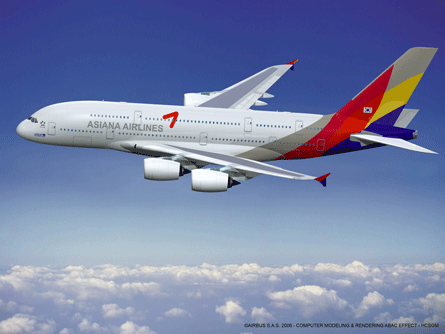South Korea's Asiana Airlines is yet to reach a decision on the engines for six newly ordered Airbus A380s, but insists the recent problems with Rolls-Royce's Trent 900 will not necessarily disadvantage the manufacturer.
Asiana plans to take delivery of the aircraft from 2014. Two will arrive in 2014, two more in 2015 and the remaining pair in 2017.
The Star Alliance carrier has yet to select engines for the A380s, but says the Trent 900 problems that emerged after the Qantas A380 incident in November are not the reason for the delayed decision, and it is assessing both the Trent and the Engine Alliance GP7200.
Asiana has 30 A350s on order, for which the Rolls-Royce Trent XWB is the only engine, but its current long-haul fleet is fitted mostly with General Electric and Pratt & Whitney powerplants. Rival Korean Air's A380s will have GP7200s.
 |
|---|
© Airbus |
It has not given details of its A380 configuration - Korean Air has just disclosed a 407-seat layout - but Airbus says the type will have a "premium layout". Asiana says the interior will focus on first and business class and will have more of these seats than its current Boeing 747 fleet.
However, the airline is uncertain whether it will follow Korean Air in adopting an all-business upper deck. "With the A380, Asiana will be able to take its award-winning service to a new level, offering the very highest standards of comfort in the sky," says Asiana chief Yoon Young-Doo.
"The significantly reduced operating costs and fuel efficiencies afforded by the aircraft will enable us to enhance our productivity and reduce our carbon footprint," he says.
Asiana plans to use the A380s to replace its older 747s. The airline says these aircraft will most likely be converted to freighters, but has not said how many might undergo the change.
The twin-deck A380s will be deployed to Europe and USA, while the A350s that the airline has on order will be used on shorter routes within Asia, such as to China and Japan.
Airbus chief operating officer for customers John Leahy says: "The order is a further endorsement of the A380 as the most efficient tool to meet demand on the world's most heavily travelled routes, especially out of the fast-growing Asia-Pacific region."
Airbus has not confirmed the date of the Asiana agreement and whether it will be booked against its 2010 order figures, the final total for which will be released on 17 January. Asiana brings overall A380 orders to 240 from 18 customers.
Source: Flight International























